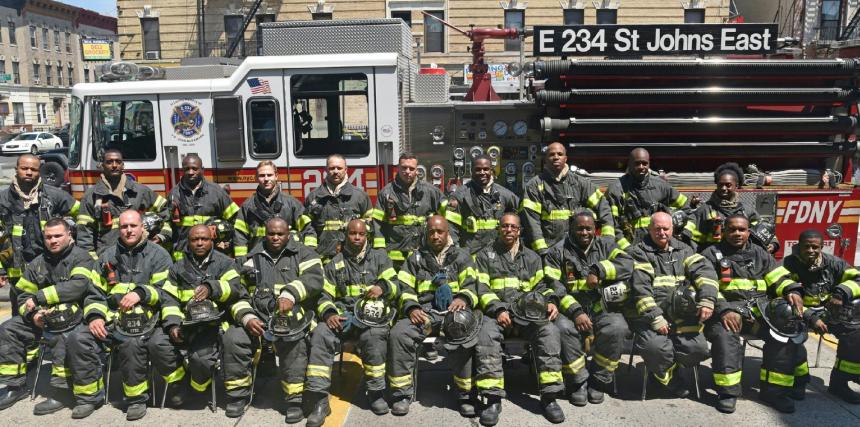Last week, CCR learned that Engine 234 in Crown Heights, the fire company of Paul Washington, former President of the Vulcan Society, the fraternal organization of Black firefighters in the FDNY, a CCR client in Vulcan Society v. City of New York, is now the first majority Black fire company in FDNY history. We talked to Paul about how he feels about this news, CCR’s role in challenging racial injustice in the FDNY, and what Paul hopes for the future.
Tell us what it’s like to be part of the first majority Black fire company in FDNY history.
It feels good. We are the first majority Black company in 150 years of FDNY history. Before this, no company even came close to being majority Black. Before this, our company was like all others in the fire department: majority white with a few Black firefighters.
That said, we are just one company, in one firehouse; the whole firehouse is not majority Black. The whole firehouse is composed of about 1/3 Black firefighters. There are approximately 300 companies in New York City, and just one of them is majority Black. We are an aberration, just a drop in the bucket. It has been a process to get where we are today, and I don’t expect to see anything similar throughout the city in large numbers. I expect we’ll be like other cities, which have majority Black companies, but just a handful of them.
How did CCR’s lawsuit fit within the broader effort to challenge FDNY discrimination?
The changes we’ve seen would not have happened without the increased number of Black firefighters coming onto the job. And without question, CCR and Levy Ratner’s lawsuit was a big reason why so many Black folks have entered the FDNY in recent years. Because of the lawsuit, in the last three years, the fire department has hired more Black firefighters than it had in the past 30 years. According to statistics collected by the Vulcans Society, between 1983 and 2013, there had been approximately 400 Black firefighters hired; since January 2013, the FDNY has hired more than 400 Black firefighters.
I can clearly remember walking into CCR—I had never heard of the organization, and I did not have high hopes. When [fellow Vulcans member] Mike Marshall and I walked into CCR’s office in 1999 to explain that we wanted to take legal action against the Fire Department, no other law firm or legal organization had been willing to touch the issue. We knew nothing about how our request for help would turn out, nothing about what kind of case to bring—we just went to CCR complaining. We knew the FDNY was discriminating on the basis of race, we knew Black applicants were getting disproportionately rejected because of background checks, we knew the FDNY was administering a test that was not job related, we knew FDNY recruitment efforts were a joke—but we didn’t know how this would translate into legal action. But CCR did, and was willing to take the case. We went through a lot of lawyers and law firms and never saw any action until we went to CCR. And CCR took the ball and ran with it and never charged us a penny.
People should support CCR—not only because of the work you all did regarding the fire department, but also regarding the NYPD[’s racially discriminatory policing practices], [working to close] Guantánamo, and other work. CCR’s efforts speak volumes, and the organization needs support for that work to continue.
What do you hope and expect for the future of racial justice efforts in the FDNY?
We hope more and more Black firefighters will come onto the job. The fire department is doing much better regarding racial diversity than it was in the past, but it’s still not where it should be. Approximately seventeen percent of new hires are Black, which is better than the three percent it had long been. But approximately 25% of the New York City population is Black, and Black firefighters should be hired at least that rate. Moreover, the FDNY discriminated against Black applicants for 150 years—how do we remedy that? Even if Black firefighters are eventually hired at a rate of 25%, that does not ameliorate or provide justice for 150 years of exclusion. It seems to me that justice would require hiring Black firefighters at a rate that exceeds 25%. So things are better, but they are not where they should be.
When you think of all the thousands of Black men and women who did not get this job over those decades, it’s a real travesty of justice. Joining the FDNY at a rate of 17% and having a single company that is majority Black does not even the scales. There are approximately 300 companies in the FDNY, and if you took a picture of the other 299, none of them would look like ours. So we should be proud of what we have achieved, but we should not get carried away with how successful we have been at prompting change, we should not rest on our laurels.


